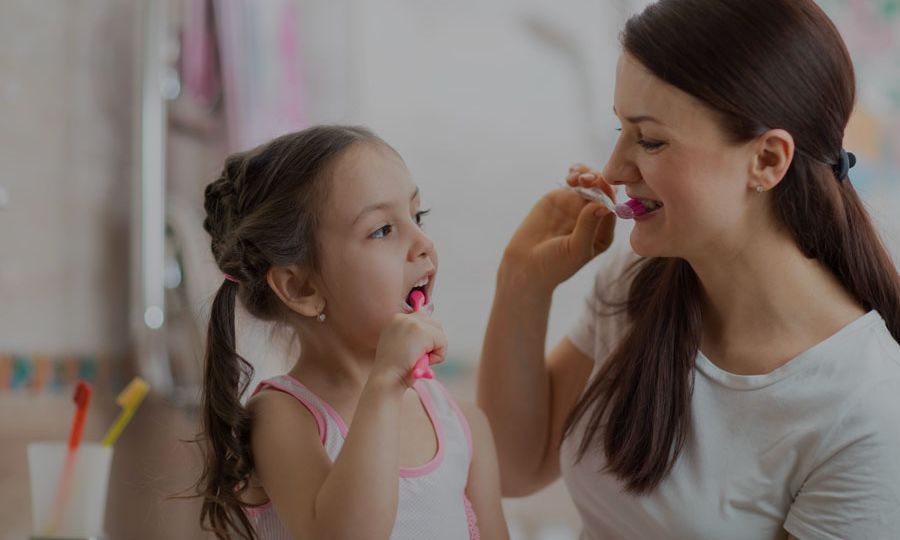
Taking care of your infant’s oral health is crucial to their development. Healthy baby teeth pave the way to healthy adult teeth and help your child with chewing, speaking clearly and much more in their future. Practicing good oral hygiene should start as soon as your child is a couple of months old, though they may be small baby teeth are very important for your child’s development. Check out these eight oral hygiene tips for infants that every parent should know!
Routine Dental Checkups
Your baby should have frequent dental check-ups, just like adults! It is recommended by The American Academy of Pediatric Dentistry that your child sees a dentist by the age of one or within six months after their first tooth erupts. Here are some things you can expect at your child’s first dental appointment:
- X-Rays to ensure proper jaw development
- A full examination of gums, bite and jaw
- A gentle cleaning
Whereas your baby can’t communicate their oral hygiene needs with you, it is important they see a pediatric dentist so they can. Seeing a pediatric dentist will allow parents to gain insight into their child’s development by being able to ask questions and be shown how to properly care for your child’s teeth and gums.
Brushing Routine
By the time your child is two years old, you should be helping them brush their teeth for two minutes at a time and twice a day. Use a grain size of toothpaste on a baby toothbrush and guide their arm into circular motions around their teeth or simply do it yourself. It is important to establish a good oral hygiene routine when they are young so they become familiar with the concept of oral hygiene and become comfortable around the tools necessary to keep their mouth clean.
Use The Right Tools
Taking care of your baby’s gum goes without saying but many people are unsure how to do it, with so many tools on the market to get the job done it can be an overwhelming experience for parents to choose just one. Though there are a great number of tools out there to clean your baby’s gums, there are simpler ways that are just as effective. Give these tips a try next time you clean your babies mouth:
- Use a wet cloth wrapped around your finger and gently wipe the upper and lower gum pad once.
- Use a wet gauze and follow the same steps as above
- Use damp cotton and follow the same steps as above
When you put your finger near your baby’s mouth, they will open with ease thinking you are feeding them. It is just as common for your baby to close their lips around your finger when you are cleaning their gums, this is no reason to stop cleaning. Once you continue with your finger, they will reopen their mouth and it will be a seamless process for you both.
Start before Teeth Come In
Taking care of your infant’s oral hygiene begins before their teeth start growing. This is especially important as it ensures they have healthy gums to support their teeth that will be popping in shortly. Some great ways to strengthen your baby’s gums include fluoride intake through tap water, washing their gums with a cloth twice daily and rinse their mouth after feeding them.
Monitor Their Diet
Reading the food labels could save your baby’s teeth. Foods that are high in starch and sugar could cause damage to their growing teeth and gums which will result in many more problems later on in life. The best food for your babies growing mouth includes keywords like:
- Sugar-Free
- Organic
- No added sugars or preservatives
Though some sugars are good for your child, the best ones would be natural like fruits. When your baby’s teeth start to grow and they are able to chew, cut up strawberries are an excellent source of healthy sugar and they are a super food for their teeth.
Don’t go to bed with a bottle – only water!
If your baby is going to bed with a bottle, it is important the only liquid inside of it is water. Parents often time make the mistake of letting their baby fall asleep with a warm bottle of milk or natural fruit juice, but these can cause detrimental damage to your child’s teeth and gums. Baby bottle tooth decay happens when sugary liquids cling to the child’s teeth for long periods of time resulting in acid attacking the teeth.
Comfort Them The Right Way
Teething can be an uncomfortable time for your baby, it’s important to equip yourself with the proper tools to battle teething pain while keeping their mouth clean and healthy. Instead of reaching for teething crackers, give these a try:
- a chilled teething ring
- a cold wet face cloth.
- a teething toy
These are much better options that will help prevent tooth decay and keep pay at bay for your teething baby. Speak to your child pediatric dentist about teething tips and tricks that can make this transition a breeze for both you and your child!






